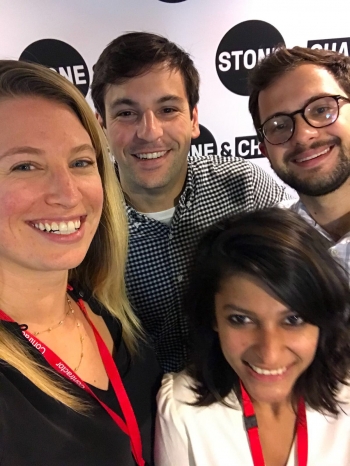
 Last fall, as part of a global experiential learning course at Tuck, I and five classmates spent three weeks in Australia, exploring ways to harness new technologies in retail loan origination and assessment processes. After completing some secondary research on-campus and conducting interviews to familiarize ourselves with the space during Phase I of the project, we headed to Brisbane with our faculty advisor for Phase II, during which we collaborated with one of Australia’s top ten banks to develop a tangible framework.
Last fall, as part of a global experiential learning course at Tuck, I and five classmates spent three weeks in Australia, exploring ways to harness new technologies in retail loan origination and assessment processes. After completing some secondary research on-campus and conducting interviews to familiarize ourselves with the space during Phase I of the project, we headed to Brisbane with our faculty advisor for Phase II, during which we collaborated with one of Australia’s top ten banks to develop a tangible framework.
Having worked full-time for three weeks on a project outside of our team’s intellectual and geographic comfort zone, I realized how powerful diversity of minds and backgrounds can make a project rewarding for all stakeholders. It was extremely exciting to be constantly inspired by the input of my teammates, and intellectually stimulating to look at the same issue from different angles.
Our goal as a team was not just identifying a process that integrates fintechs, or, making sense of menu of options available on the technology side. Throughout our study, we also learned how valuable it can be to take a new look at the present business landscape and analyze hard choices that might have tangible, long-term impact.
Leveraging the opinions of retail bankers from multiple groups, we framed the overall issues differently. We synthesized pain points, and collated them into meaningful categories, and through this approach, were able to fine-tune our framework. Most importantly, we put together a final presentation about our key takeaways, and turned this opportunity into a dialogue with the bank’s management team.
Going beyond buzzwords about emerging technologies, blockchain being the most important one, we realized that it was difficult to find material implications to finance and predict a timeline. However, the real learning opportunity here was actually in projecting the future of retail banking, which is converging into the technology space at an unstoppable pace.
In an ever more automated world, retail banks need to find a delicate balance between technology and customer relationships. Although highlighting one over the other may not dramatically hurt profitability of a bank today, it may significantly threaten its existence within five years, given the fiercely competitive landscape disrupted by fintechs.
The future for retail banking lies in building ecosystems, requiring platformization. In this journey, banks as platforms that can attract the right companies, allowing them to better serve their customers during important life events, will be ahead of the game.
This OnSite Global Consulting opportunity was enabled by the ongoing partnership between this Australian bank and Tuck’s Center for Digital Strategies (CDS). This is the third year in a row there has been an OnSite Global Consulting project in Brisbane/Sydney, brought in and advised by the executive director of the CDS.